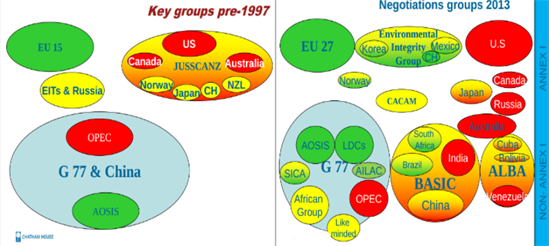Mat Hope
24.01.2014 | 2:00pmInternational climate change negotiations are often rather combative events, with countries grouping together to push their agendas. But what was once a contest between a few key players now involves increasingly fragmented groups, according to one expert.
That’s not necessarily a bad thing, however.
Countries are increasingly abandoning old political divisions in favour of new groups, Farhana Yamin, an Associate Fellow at international affairs thinktank Chatham House told policymakers yesterday. She argues that by establishing new alliances focussed around policy issues, countries can find fresh common ground, and improve the prospects for a new global deal.
Old and new groups
In the early days of negotiations aimed at forging an agreement between countries to tackle climate change, nations used to group together in a few easy to identify groups. But Yamin says the groups the have multiplied in recent years, as more countries find their voices in the negotiations.
As the charts below suggest, it’s become a considerably more fragmented political scene:
Source: Farhana Yamin. The colours represent whether each country or group wants a legally binding international agreement: those in green are for it, and those in red are opposed.
Yamin says one reason for the fragmentation is that the old groups no longer serve a political purpose for some smaller states. In the early days of the negotiations, countries were broadly grouped along a north/south divide. This allowed developing countries “a seat at the table” Yamin says, which would have been impossible for nations trying to act alone.
But lots of countries with small economies in 1997 have grown rapidly – such as India, China, and Brazil – giving them more confidence in the international arena. These countries now demand to be heard in their own right, not just as part of a group, Yamin says. It also means that many countries’ interests have diverged from their group’s position, creating new rifts.
Yamin says that means policymakers have needed to fight many more battles to get agreement in recent years. Today, “there are many more voices to be bought off, to put it crudely”, she says.
Policy focus
But more fragmentation is not necessarily a bad thing, Yamin says.
One consequence of the new groups forming is that countries are now coming together to focus on particular policy areas. While that may not make as many headlines as countries agreeing an overarching deal, it could be a more effective way to tackle climate change.
For example, last December, countries agreed to establish a new mechanism to compensate nations hit by natural disasters as a consequence of climate change at the latest meeting in Warsaw. The Philippines’ delegation, galvanised by the devastation wrought by Typhoon Haiyan days before, led the efforts to establish the new scheme. The Alliance of Small Island States – composed of nations that are likely to feel the early impacts of climate change most harshly – and China joined them in calling for developed countries to foot the bill for damage abroad.
The EU’s climate commissioner, Connie Hedegaard, offered “congratulations” to the group for pushing the mechanism through, saying it was one of the meeting’s few successes.
Optimism
Despite the negotiations becoming more complex, Yamin remains optimistic that a new deal can be thrashed out by 2015 – even if it is only a “weak agreement”, she adds.
She says that countries are starting to “dissolve” old political divisions by coming together over specific policy issues. As a consequence, more countries are having their say, and policymakers can find new common ground and negotiate more equitable ways to tackle climate change.
For that reason, having more voices in the international climate debate could turn out to be a positive thing, even if there are more fights along the way.


